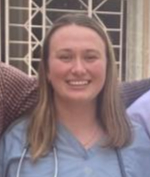Reflections from Uganda: What Kampala Taught Me About Belonging
- Theresa Kirisamagi

- Nov 4, 2025
- 2 min read
Updated: Nov 13, 2025
Written by Theresa Kirsimagi
University of Vermont Larner College of Medicine
Global Health Elective Dates: June 30 – August 9, 2025
8/13/25
Stephentown, NY
Cruising down the expressway from the arrivals terminal of JFK, it dawned on me. Instead of being packed into a taxi behind rows of other commuters, coughing from the fumes belched out by the many rusted tailpipes, I was silently and comfortably moving through the darkness beside countless other sleek capsules. Each was an enclosed reminder of the way that we have the luxury of individualism, and in that luxury, the choice to separate ourselves from others. We have replaced people with things.
The crowded marketplaces of Kampala sprang into my head, and I reflected on the way that everyone had a massive network of “brothers” and “sisters” too innumerable to realistically be their blood relatives. I thought of Peter, the family driver, who had reminded me with a wry smile, “You can never have too many friends”. He broke the silence again by talking about all the other visitors he had driven back to the airport in his 19 years of service — doctors, reverends, tourists. He rubbed his lower back, which ached from the many long years of sitting in that seat; none of them, he explained, had ever kept in touch with him after they returned to the US. The lines on his face showed disappointment, even hurt, that they didn’t share his desire for connection.
In the close Ugandan communities that I lived in, people recognized that they needed others — having large families to ensure their care as they aged and fell sick, gathering on Sundays to socialize and build community, taking the time to greet each other to what Westerners would consider excess. I remembered my encounter earlier that week with a young woman tending to two babies in the Mwanimugimu malnutrition unit. During the afternoon lull after the buzz of morning rounds, I wandered over and asked how her baby was today. She responded by saying that that baby was not hers, but her sister’s. I gestured to the second baby lying on the bed and asked if that was her baby, to which she again responded no; this baby belonged to a friend who was ill. I was shocked. She had spent days in this unit with 30 other screaming children and their anxious caregivers, every few hours meticulously feeding these two children who were not her own — or at least from my perception, not her own. Judging by her actions, she felt differently.
In developed countries, things make our lives easier every day. As our needs are taken care of by our cars, phones, washing machines, and countless other possessions, we become seemingly less trusting of, invested in, and interested in each other. While there is nothing wrong with having convenience, leisure time, and independence, the crux of the issue is what we choose to do with it and if that choice brings us closer to mankind or farther from it. At our core, we crave human connection and desperately need it to function as a society. My hope is that, with this realization, we can replace the things in our life with people and become happier for it.




























